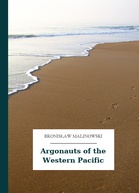Argonauts of the Western Pacific - Bronisław Malinowski (darmowa biblioteka online .TXT) 📖

Argonauts of the Western Pacific to rozprawa naukowa autorstwa Bronisława Malinowskiego. Jest ona efektem wyprawy badacza na wyspy Toulon i wyspy Trobriandzkie.
Malinowski opisuje w niej przede wszystkim rytuał Kula, ukazujący zdolności handlowe ludów tam żyjących. Rytuał polega na wymianie biżuterii, opierającej się na pewnych szytwno ustalonych regułach związanych m.in. z równą wartością wymienianych przedmiotów. Malinowski upatruje w przedstawicielach społeczeństw pierwotnych wcielenia Argonautów z mitologii greckiej, którzy udali się po Złote Runo. Rozprawa Malinowskiego została oparta na wynikach jego metody badań antropologicznych — metody uczestniczącej, a nie wyłącznie obserwacyjnej. Jego działalność była przełomowa dla antropologii, która do tej pory bazowała na prowadzeniu obserwacji, a także rozszerzaniu założeń na kolejne wyniki badań.
Bronisław Malinowski był polskim antropologiem i socjologiem publikującym w pierwszej połowie XIX wieku. Prowadził badania społeczeństw pierwotnych w różnych zakątkach świata.
- Autor: Bronisław Malinowski
- Epoka: Współczesność
- Rodzaj: Epika
Czytasz książkę online - «Argonauts of the Western Pacific - Bronisław Malinowski (darmowa biblioteka online .TXT) 📖». Wszystkie książki tego autora 👉 Bronisław Malinowski
Of course these two examples belong to the longer type consisting of three parts. Many of the spells previously quoted in free translation contain no main part, though it is possible to distinguish their u’ula (exordium) from their dogina (finale). The very first spell quoted in Chapter VI, the formula of the Vabusi Tokway (the expulsion of the wood sprite) is an anomalous one. It is an invocation, and it is not even chanted but has to be spoken in a low persuasive voice. It consists of two parts: in the first one the word kubusi („thou comest down”) used as an imperative, „come down!”, is repeated with all sorts of descriptions and circumscriptions of the woodsprites. In the second part, several sentences are repeated to make the wood-sprite feel that he has been chased away. Both the keyword of the first part, kubusi, and the sentences of the second part have a direct force of their own. It must be realised that, for the natives, it is a great insult to be told to go away. Yoba, the „expulsion”, the „command to go” stands in a category of its own. People are yoba’d, expelled from communities in certain circumstances, and a man would never dream of remaining, when thus treated. Therefore the words in this spell possess a force due to social sanctions of native custom. The next spell, given in Chapter VI, the Kaymomwa’u, is also anomalous for it consists of one part only. The word kubusi, „come down”, is also repeated here, with various words designating defilements and broken taboos. These qualities are, however, not thought of as personified beings. The force of the word is probably also derived from the ideas about the yoba.
The second spell, which is a pendant to the Kaymomwa’u, the Kaygagabile, or spell of lightness, begins with a typical u’ula:
Susuwayliguwa (repeated) (He fails to outrun me); Titavaguwa (repeated) (the canoe trembles with speed);mabuguwa (repeated) (magical word); mabugu (mabugu), mabugamugwa (mabugu-ancient);mabugu (mabugu),mabuguva’u (mabugu-new).
The first two words are compounds with prefixes and suffixes added for magical purposes, as a sort of magical trimming. The untranslatable word, said by the natives to be megwa wala („just magic”) is repeated several times in symmetry with the previous two words and then with the two suffixes; ancient and new. Such repetitions with prefixes or suffixes of antithetic meaning are a frequent feature of magical trimming of words. This exordium affords a clear example of the magical play on words, of transformations for the sake of rhythm and symmetry; of repetitions of the same words with antithetic affixes. In the following part of the spell, the word ka’i (tree) is repeated with verbs: „the tree flies” etc., and it functions as a key-word. It is difficult to decide whether this part is a true tapwana or only one of the not infrequent examples of an u’ula with a keyword.
Let us survey a few more of the u’ula (first parts) of the canoe spells, and then proceed to the examination of the middle parts and ends. In the next spell of Chapter VI, the Kapitunena Duku spell, the word bavisivisi, „I shall wave them back” (that is: the other canoes), is repeated ponderously several times. The opening of a spell with one word, which summarises in a metaphorical manner the aim of the spell, is often found in Kiriwinian magic. In this spell there follow the words:
Sîyá (Siya hill (on)) dábanâ (top of) Tókunâ (Takuna) ínenâ (the women) Sinegu (My mother) bwaga’u (sorcerer), tatogu (myself) bwaga’u (sorcerer).
These words are pronounced with a heavy, thumping rhythm, as indicated by the sharp and circumflex accents. The second line shows a rhythmic and symmetrical arrangement of words. The remainder of the u’ula of this spell is similar to the same part in the wayugo spell, which has been given here in full native text (compare the free translations of both spells in previous Chapters).
In the ligogu spell of the same Chapter, the u’ula opens with another juggling of words:
virayra’i (repeated) (female rayra’i); morayra’i (repeated) (male rayra’i); basilabusi (I shall penetrate (at)) Wayayla (Wayayla), basilalaguwa (I shall emerge (at)) Oyanaki (Oyanaki); basilalaguwa (I shall emerge (at)) Wayayla (Wayayla), basilabusi (I shall penetrate) Oyanaki (Oyanaki);
This part of the u’ula has not been translated in the text, as its meaning is „magical” and can be better grasped in connection with the native text. The word rayra’i is a magical word only. It is first given with the antithetic opposition of the male and female prefixes vi- and mo-. The following phrase is a typical example of a geographical antithesis. The two names refer to the promontories facing one other across the sea passage Kaulokoki, between Boyowa and Kayleula. Why those two points are mentioned I could not find out.
In the kadumiyala spell, given in Chapter IX, we have the following opening :
Vinapega, pega; vinamwana, mwana;
nam mayouyai, makariyouya’i, odabwana;
nam mayouya’i, makariyouya’i, o’u’ula.
In the first line, we have the symmetrically uttered and prefixed names of the two flying or jumping fishes, pega and mwana. The prefix vina- is probably the female prefix and may convey the meaning of flying’s being associated with women, that is with the flying witches. The second and third verse contain a play on the root yova or yo’u „to fly”, reduplicated and with several affixes added. These two verses are brought into a sort of antithesis by the last two words, odabwana and o’u’ula, or „at the top” and „at the bottom” or here, probably, at the one end of the canoe and at the other.
In the Bisila spell, given in the same chapter, we have the beginning:
Bora’i, bora’i, borayyova, biyova;
Bora’i, bora’i, borayteta, biteta.
The word bora’i seems to be again a purely magical one. The prefix bo- carries the meaning of tabooed, or ritual; the root ra’i suggests similarity with the above quoted magical word rayra’i, which is obviously merely a reduplicated form of ra’i. This is therefore a rhythmically constructed play on the magical root ra’i, and the words yova, „to fly” and teta, „to be poised”, „to soar”.
The Kayikuna veva spell presents the following rhythmic and symmetrical exordium:
Bosuyasuya (repeated); boraguragu (repeated).
Bosuya olumwalela; boyragu okatalena.
The exact meaning of the two words is not quite clear, except that they represent magical influences. Their arrangement and the antithesis of olumwalela („middle part”, „inside”), and katalena („body” or „outside”) is in keeping with the features observed in the other beginnings here quoted.
VIIThe tapwana (main parts) of the spells, though they take a much longer time in reciting, are simpler in construction. Many spells, moreover, have no middle part at all. The first regular tapwana we find in our spells is that in the Kapitunena Duku. There, we have a series of key-words recited with a list of complimentary expressions. The key-words are verbs, spoken in the form:
matai (cut), matake’i (cut at), meyova (fly), etc.
These verbs are used in this spell with the prefix ma- or me-, which represents the tense of indefinite duration. This prefix, although, as far as I know, found in several Melanesian languages in full vigour, has in Kiriwina a distinctly archaic flavour, and is only used in certain locutions and in magic. Some of the verbs used in this spell are metaphorical in their meaning, describing the speed of the canoe in a figurative manner. The list of the complimentary words repeated with the key-words contains the enumeration of the different parts of the canoe. It is typical that the key-words are in their form archaic and in their meaning figurative, while the complimentary terms are just ordinary words of everyday speech.
Another regular tapwana has been given in the Kadumiyala spell in Chapter IX, where the only key-word, napuwoye, has been translated: „I impart speed magically”. The prefix na- is that of the definite tense. The formative pu- I was unable to translate, while the root woye means literally „to beat” and in a somewhat more remote sense, „to impart magic”. In the Kayikuna veva spell, the pair bwoytalo’i, bosuyare, meaning „paint red in a ritual manner”,and „wreathe in a ritual manner”, are given formal resemblance by the alliterative prefix bo-, which carries with it the meaning of „ritual”.
We see that the number of the tapwana is smaller, since only three spells out of seven have got it. In form, the tapwana are simpler than the u’ula, and an examination of a greater number of key-words would show that they also express directly or figuratively the magical action or its effect, Thus, here we had a verb denoting the imparting of magic, that is the direct expression of the action; then two words figuratively expressing it, and the series of verbal key-words enumerating the effects of the magic, such as flying, speed, etc. In other canoe spells, not given in this book, there could be found similar types of key-words such as: „the canoe flies”; „the buriwada fish is poised on a wave”; „the reef-heron wades”; „the reefheron skirts the beach”..., all of them expressing the aim of the spell in accordance with the magical trend of thought.
VIIIFrom the linguistic point of view, the final parts of the spells, the dogina, present, as a rule, fewer remarkable features. Phonetically the most outstanding trait is the purely onomatopoetic sound complexes, such as sididi or saidididi, or the three words sididi, tatata, numsa, found in the Kadumiyala spell. From the point of view of meaning, there are in some of the dogina interesting metaphorical turns of speech, such as the descriptions of time in the Kaygagabile spell, where the difference in speed between the magician and his companions is expressed by allusions to the morning and evening sun, couched in figurative speech. Some mythical allusions also find their way into the dogina. These parts of a spell are undoubtly the least important in the natives’ eyes; very often the same dogina is used with a number of formulae belonging to the one cycle, as we have noticed. Other spells have no dogina at all, for instance, that of Kapitunena Duku, where the onomatopoetic sound sidididi stands for the whole dogina. As said above, the manner of reciting these parts is more perfunctory, with fewer melodic modulations and phonetic peculiarities.
IXI have given so far a short linguistic survey of the canoe spells, dealing first with their initial parts, u’ula, then with their main parts, tapwana, and lastly saying a few words about the dogina. In a still more summary manner, I shall give a short survey of the mwasila (Kula magic) spells, quoted or ment[...] in this book, beginning with the u’ula.
In the Yawarwpu spell (Chapter



Uwagi (0)